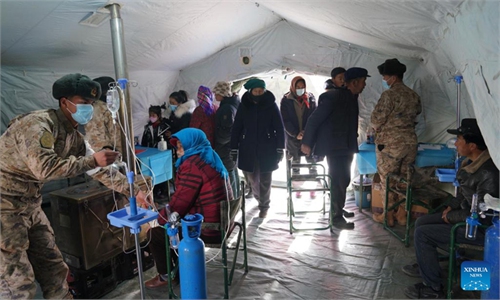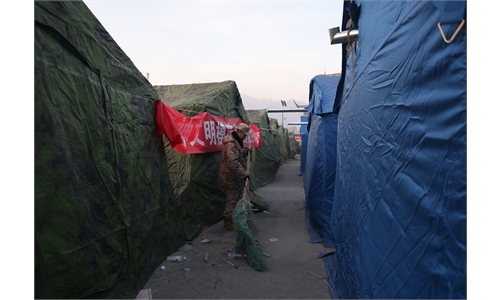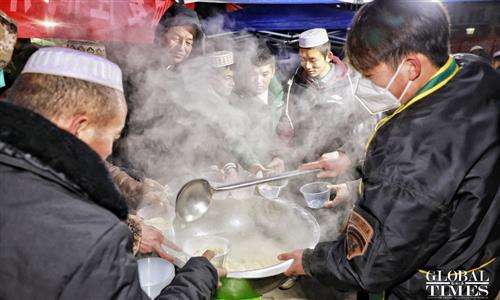A 6.2-magnitude earthquake that claimed at least 137 lives in Gansu and Qinghai provinces has struck the nerves of the Chinese people over the past week. How do the survivors recall the life-and-death moment? How difficult were the rescue operations carried out in the cold winter night at -15 C? How did they manage to keep going during those golden rescue hours?
In this piece, we give a retrospective of the life-saving race that took place in the first 48 hours in harsh winter conditions by sharing the on-the-spot accounts of survivors of the earthquake and the subsequent mudslides in Jishishan county - the epicenter of the Gansu earthquake - as well as the stories of the soldiers involved in the rescue efforts.
This story is a part of the Global Times' "Witness to history" series, which features first-hand accounts from witnesses who were at the forefront of historic moments. From scholars, politicians and diplomats to ordinary citizens, their authentic reflections on the impact of historical moments help reveal a sound future for humanity through the solid forward steps taken in the past and the present.
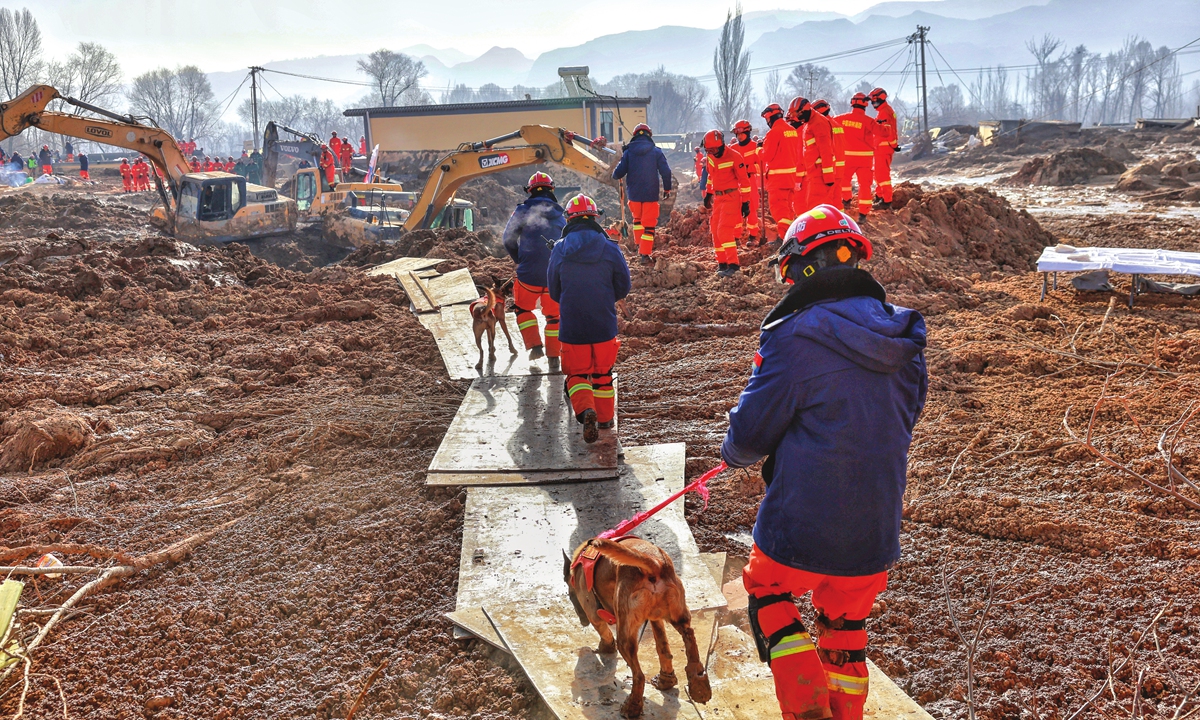
Rescue workers race against time to save lives on December 20, 2023, after a landslide swept Jintian village in Minhe county, Qinghai Province. Photo: Li Hao/GT
A bustling Lanzhou beef noodle soup stall was busy distributing noodles for free to the survivors beside a temporary resettlement camp for earthquake victims in Jintian village in Northwest China's Qinghai Province. With the steaming soup came gradually relaxed faces and unfolding smiles as the warmth comforted bellies and hearts in a temperature approaching -15 C. With the heat curling up, it was probably one of the warmest moments among people's memories from the disaster area.
Not far away, four excavators worked non-stop together to dig through 3- to 4-meter thick mud. Underneath, there were still two households and nine missing villagers.
When Global Times reporters visited Jintian village on Wednesday morning, there were still thick layers of mud, about three to four meters deep, throughout the village. The mud was super soft and one could easily sink in and get stuck if they stumbled into it.
Thrilling moments
On Monday evening, a 6.2-magnitude earthquake hit Jishishan county, Northwest China's Gansu Province, affecting neighboring Minhe county in Qinghai. Jintian village in Minhe saw an unprecedented mudslide triggered by the earthquake, which caused a rupture in a canal on the northern side of the village. The houses of 36 households, totaling 177 villagers, were destroyed by surging mud from underground.
Li Xi (pseudonym), a rescue worker who was waiting in line, was warmly handed a bowl of beef noodles by a survivor from the village, who asked him to eat first. Li smiled shyly, waved his hand in the negative. Despite working all night, he still wasn't able to help Yang Zhongcai, a villager, find his buried family members.
Thirteen people, including a pregnant woman, went missing. Yang's 100-year-old mother, 2-year-old grandson, and two other relatives were among them.
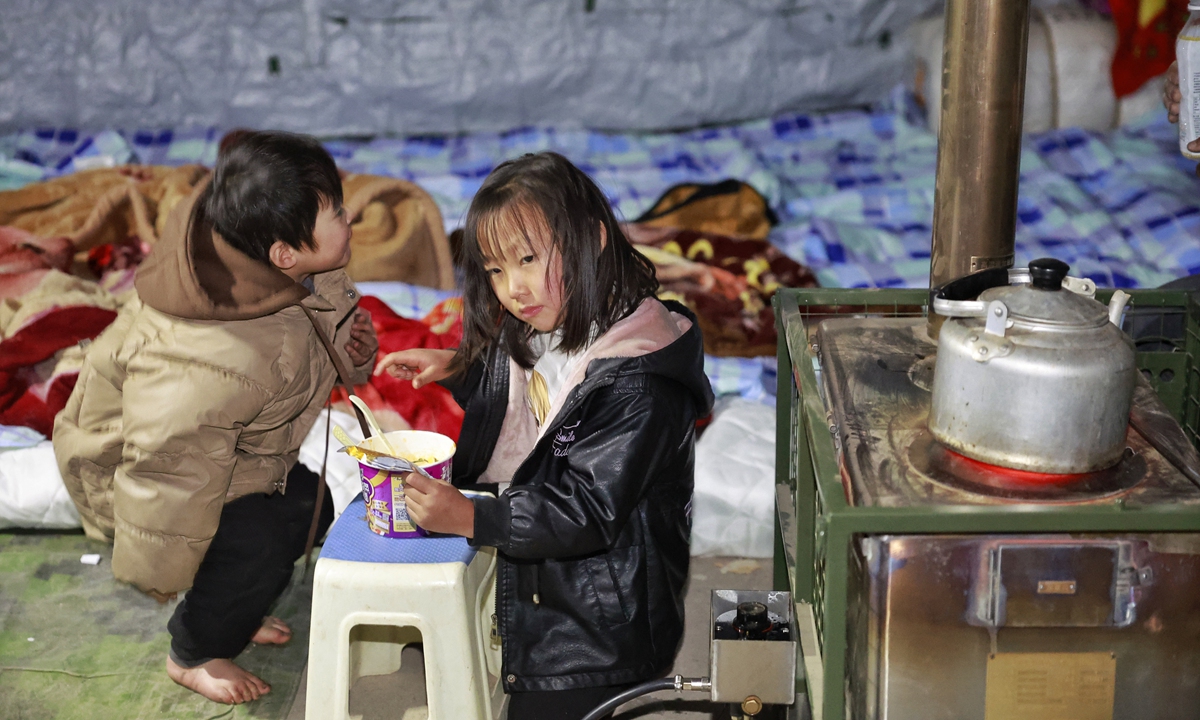
Two children have dinner in a tent in the earthquake-hit village of Dahe, Jishishan county, Gansu, on December 19, 2023. Photo: Li Hao/GT
Yang returned to the scene to provide more detailed instructions to the rescue workers about the exact location of the incident. The 75-year-old elderly man had not slept a wink all night and had been returning to the scene every a few hours to check if there was any news about his missing relatives.
"This was the most powerful earthquake I had experienced," Yang told the Global Times on Wednesday. At midnight on Monday night, he suddenly felt a strong shaking, as cups and teapots on the table fell one after another.
"I quickly woke up my wife and pulled her to run into the yard. We didn't even have time to put on shoes or socks, just grabbed a coat. While running, I shouted for my mother and grandson who live in the neighboring yard. We had only run a few meters when our house collapsed, it only took about five minutes."
"Then I saw mud flowing toward us. I was scared and wanted to go through the small path in the middle of the yard to find my mother and grandson, but the mud quickly caught up from behind and swept over us. We had to immediately run to higher ground. The mud quickly submerged the ground floor of my mother's house," Yang recalled with wet eyes.
The dirt from the night before still clung to his trouser leg.
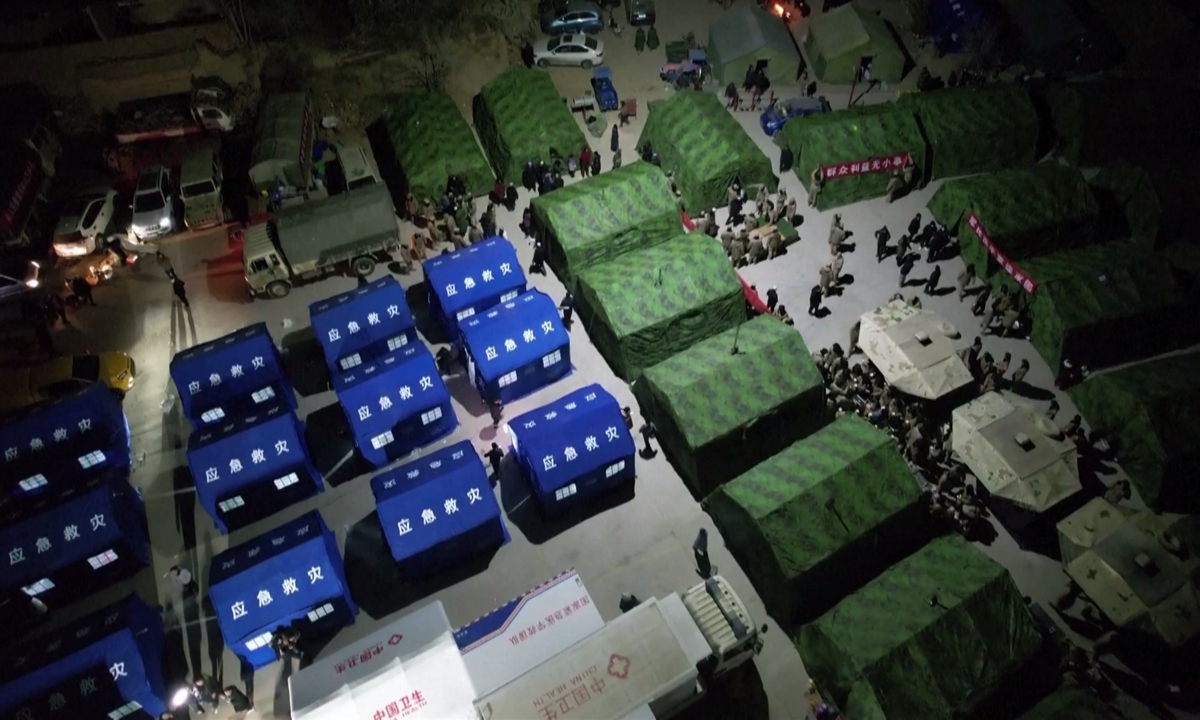
Victims spend their first night after the earthquake hit Dahe village, Jishishan county, Gansu, on December 19, 2023. Photo: VCG
Earthquakes are quite unfamiliar to local people. The last time Jishishan county experienced such a devastating earthquake was in 1936.
The lack of awareness and experience in earthquake response, especially in extremely cold weather, may be one of the reasons for the severe damage caused by the earthquake.
Yang said that he burst into tears when he saw the rescue team arrive at the scene in about just two hours.
"On that most helpless freezing night, seeing these young rescue officers and soldiers - some were not even wearing thick clothing - appear here overnight to help us find our loved ones, I felt truly grateful. I know they came to help us at the fastest speed, risking their lives," said Yang.
Li Xi was one of the young rescue soldiers who arrived in Jintian village for reinforcement early Tuesday morning.
"After we arrived, we found that the search and rescue here were very difficult. We couldn't step on the mud, so we had to build boards to make a path. This was what we called an 'initial lifeline'," Li told the Global Times.
He said one of the biggest challenges was working in the freezing cold. "It was very difficult to work at night in such cold temperatures, but we maintained 24-hour non-stop rescue. Every two hours, a group of people would rotate in and out."
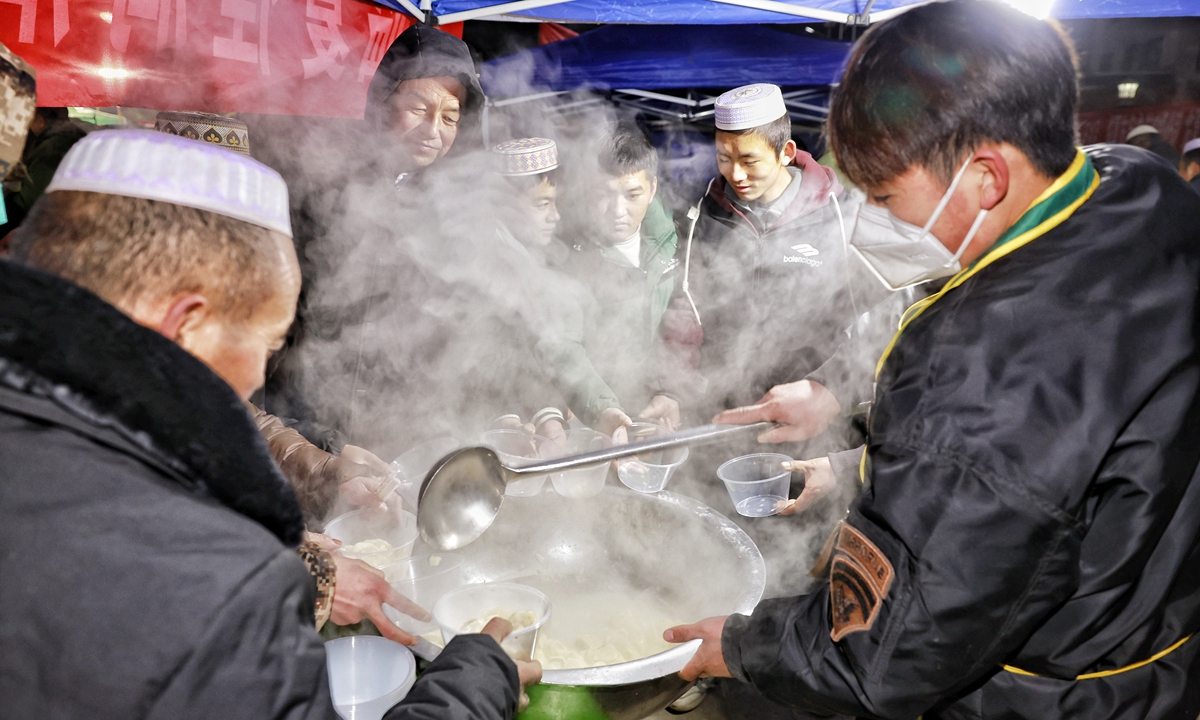
Survivors share hot food to keep warm in a temporary earthquake shelter in Dahe village, Gansu, on December 19, 2023. Photo: Li Hao/GT
Each group had three firefighters, one responsible for close observation of the excavator, one responsible for maintaining vigilance on the side, and one mobile personnel. "A layer of ice would form on the surface of the mud at night, but it was still flowing and soft underneath. If you didn't watch your step, it was easy to sink in. In this situation, we needed to be extra careful," Li said.
The lows in Gansu at night reached -15 C. Global Times reporters' hands were almost numb with the cold after less than 10 minutes, but there was no sign of stopping search and rescue on the scene when they visited Jintian village on Tuesday midnight.
The Global Times learned from a rescue team that low temperature environments can cause stiffness and muscle contractions, which greatly hinders flexibility. At the same time, it can also reduce the power supply and even cause some communication devices and rescue equipment to malfunction. Moreover, there was still snow and ice on most of the roads in the villages, which made it difficult for the rescue vehicles to travel. But these difficulties did not stop the lifeline.
Li Kai, a commander from a battalion in the PLA Western Theater Command participating in the post-disaster rescue mission, told the Global Times that after completing search and rescue efforts on Tuesday, his battalion returned to the homes of affected people to help them move furniture, livestock, and other belongings to help minimize their economic losses.
When Global Times reporters visited a temporary shelter for victims in the earthquake-hit village of Dahe in Jishishan county on Tuesday night, almost 130 tents with electricity and heating had been erected.
Local government workers were preparing hot food, free drinks and instant noodles for the victims. Supplies and rations from all over the country were being transported here constantly.
Some children were playing games inside the tents. Although the aftershocks are still uncertain, every light in the resettlement site was illuminating people's expectations for the future and the yearning for a warm home.
Full-wing supports
Rescue personnel used sonar, drones, and other equipment to carry out geological surveys during the rescue efforts. They used excavators, bulldozers, and other large machinery to quickly clear away the mud. Rescue dogs were also brought in to help.
The Global Times reporters on the scene witnessed the use of a number of high-tech equipment in disaster relief efforts, including Y-20 military aircraft used to transport large-scale rescue vehicles and the "Wing Loong" unmanned aerial vehicle (UAV) used for emergency telecommunication support and disaster reconnaissance tasks. Currently, the public communication network in the affected areas has been largely restored to normal.
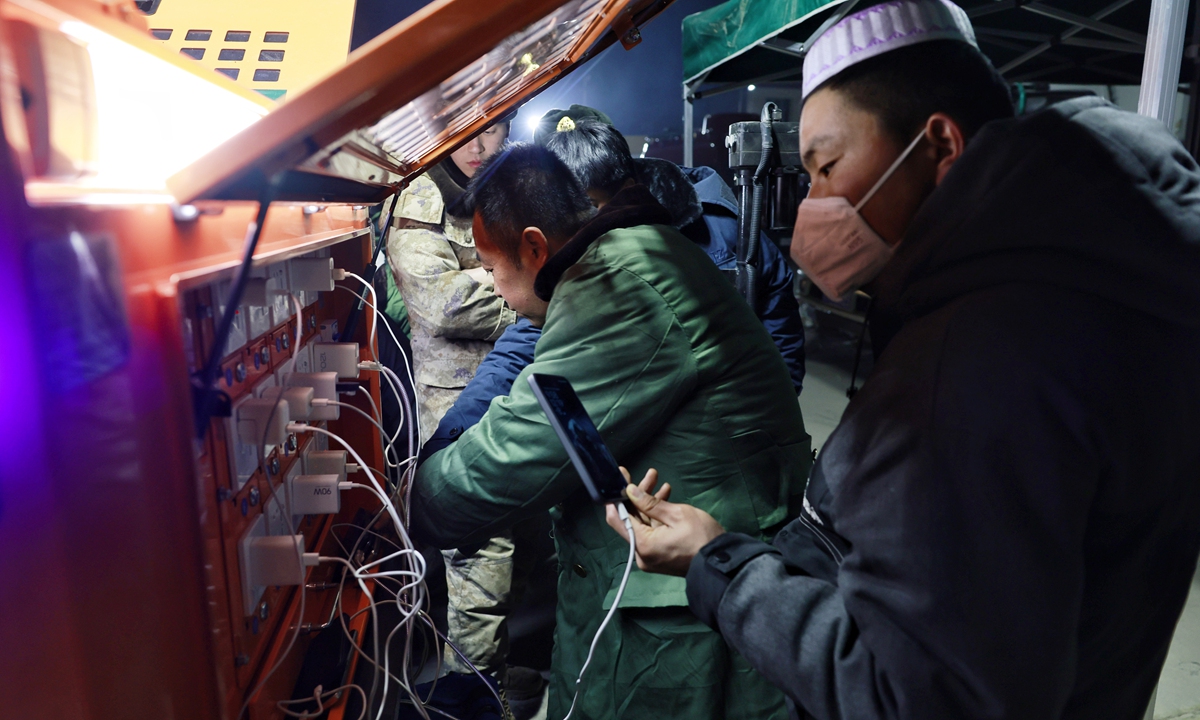
Mobile power trucks provide electricity to victims in Dahe village, Gansu, on December 19, 2023. Photo: Li Hao/GT
When the Global Times reporters left the scene on Wednesday night, the excavators were still roaring, and non-stop search and rescue efforts remained the first principle of China's response to earthquake disasters. The rescue officers and soldiers were putting in all their efforts to ensure the success of this life-saving relay.
Gansu's emergency management bureau said on Thursday that the province's earthquake relief work has achieved a phased victory, and now the local government is focusing on saving the injured, the resettlement of victims and cleaning debris from across earthquake-stricken areas.
Meanwhile, local hospitals have received a total of 784 injured people, and health authorities are currently providing psychological counseling for those impacted by the disaster.
More than 500 specialists and technicians have been dispatched to the area to survey the damage to residential areas and facilities, conduct emergency assessments of building structures, and carry out urgent repairs.
As of Thursday, the water and gas supply in Jishishan county, the epicenter of the earthquake, had resumed.
Signs of life resuming and the return of vitality are gradually emerging. Survivors are helping each other in the aftermath of the earthquake, with the full support and great efforts of the whole country.
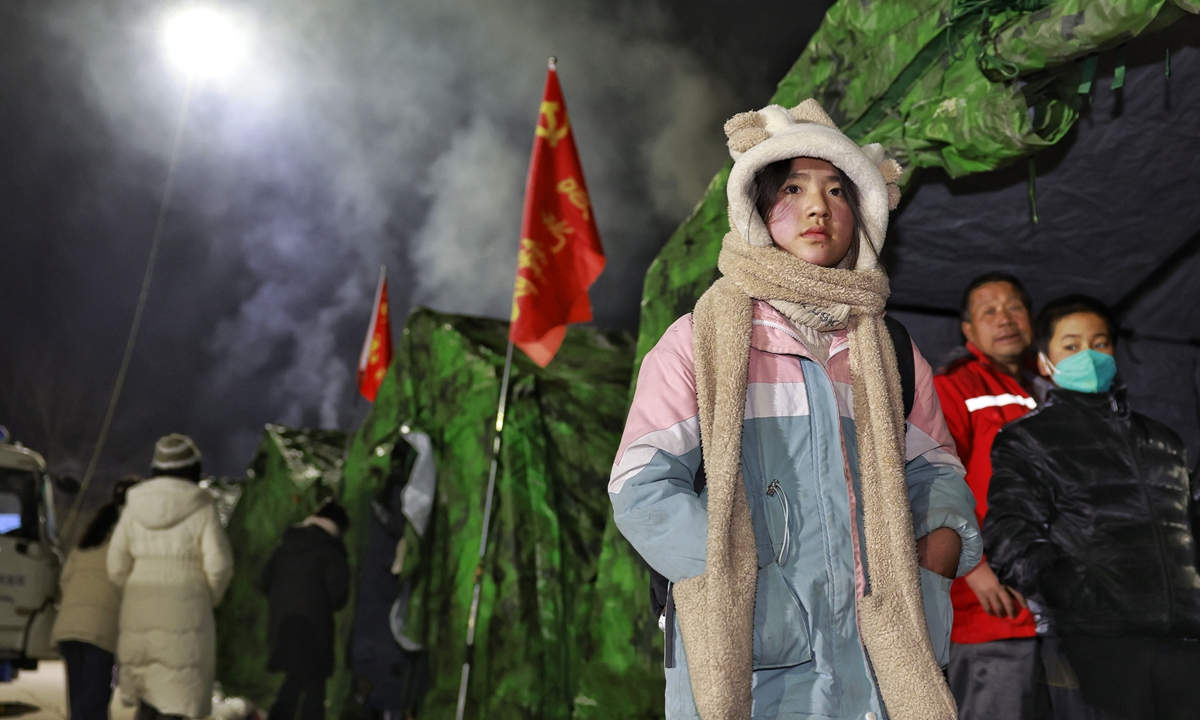
A girl stands nearby a temporary shelter for victims in the earthquake-hit village of Dahe, Jishishan county, Northwest China's Gansu Province, on December 19, 2023. Photo: Li Hao/GT



